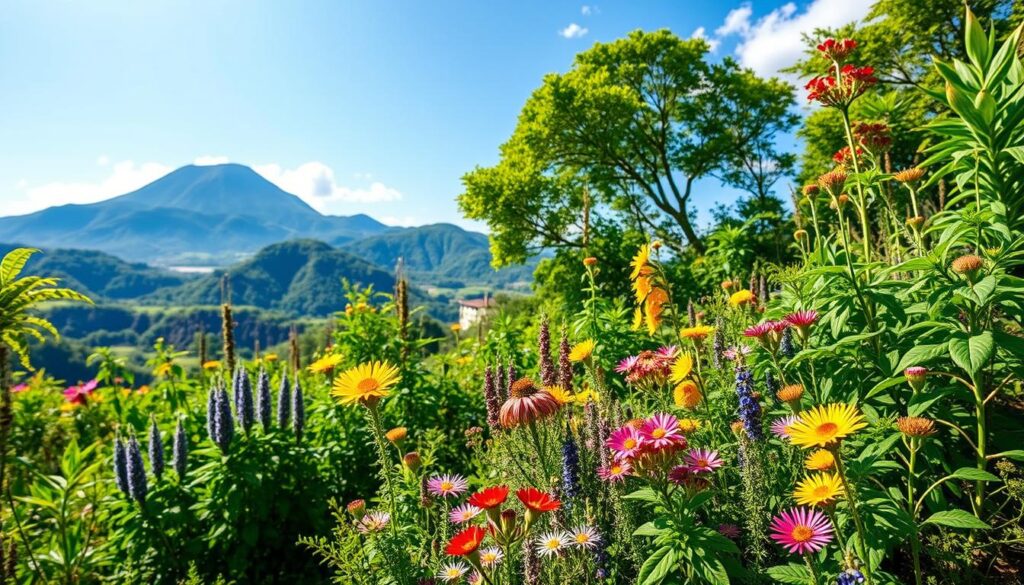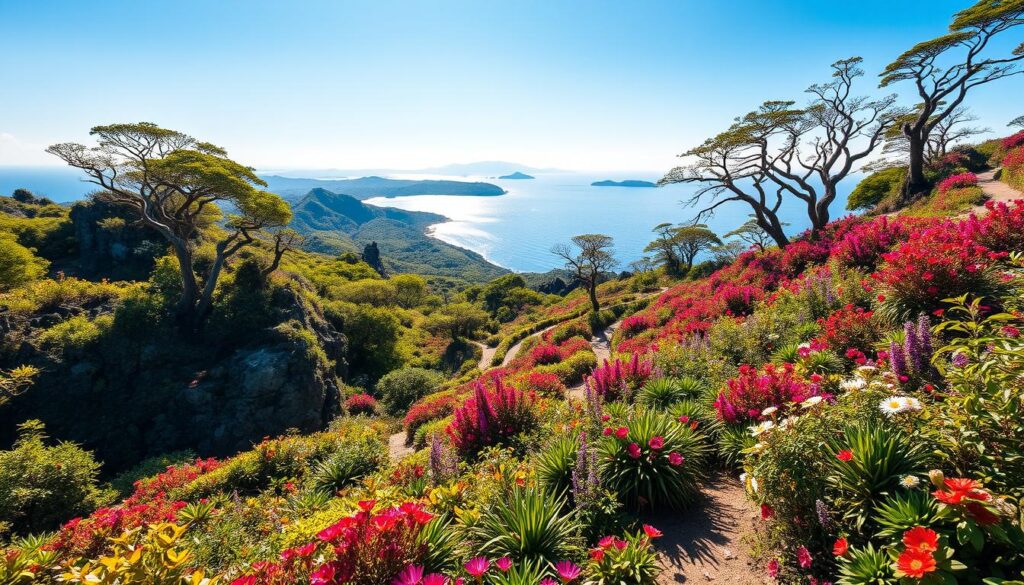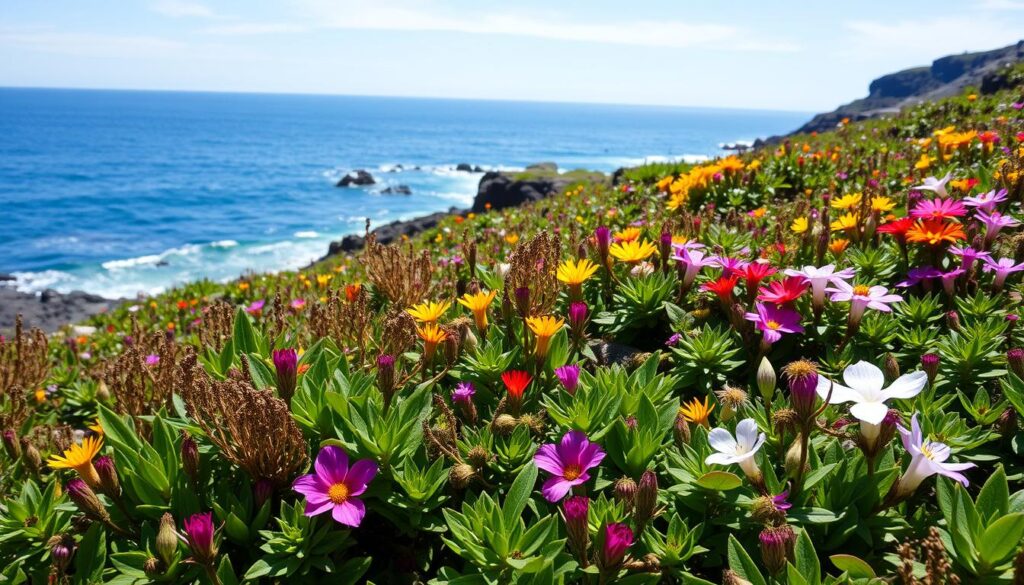Welcome to weed in Jeju amazing plant world! This South Korean island was shaped by volcanoes nearly 2 million years ago. It’s home to many plants, including weeds and native species. The island’s big mountain, Hallasan, stands at 3,835 feet.
Exploring Jeju’s plants will show you a world of native plants. These plants have grown well in the island’s subtropical climate. You’ll see both invasive and native plants, making the island’s plant life unique.
Get ready to learn about Jeju’s plants. Each one has its own story. This guide is for botanists, nature lovers, and curious travelers. It will change how you see Jeju’s plants.
Key Takeaways weed in Jeju
- Jeju Island formed through volcanic activity 2 million years ago
- Hallasan mountain creates unique growing conditions for plants
- The island hosts diverse native and invasive plant species
- Subtropical climate supports remarkable biodiversity
- Each plant contributes to Jeju’s complex ecological system
Introduction to Jeju Island’s Natural Heritage
Imagine stepping into a world where volcanic landscapes meet subtropical beauty. Jeju Island is a natural wonder. It has a unique ecosystem that fascinates scientists and travelers.
The Jeju ecosystem shows nature’s amazing creativity. It was formed by volcanic activity. The island’s foundation is made of lava and basaltic rock, creating a special place for plants and animals.
The Volcanic Origin of weed in Jeju Ecosystem
Jeju’s landscape has a fascinating story. It has 368 volcanic cone-shaped mountains called oreums. Mount Hallasan, at 1,950 meters, is South Korea’s highest peak.
- UNESCO Biosphere Reserve since 2002
- World Natural Heritage site in 2007
- Global Geopark designation in 2010
Climate and Growing Conditions
The subtropical climate of Jeju is perfect for plants. Mild temperatures and lots of rain help many plant species grow. The volcanic soil is rich in nutrients, great for plants.
Biodiversity Overview
Jeju’s natural heritage has many unique species. From coastal plants to alpine plants on Hallasan’s slopes, it’s a botanical treasure trove.
“Jeju Island is not just a destination, it’s a living ecosystem with stories written in volcanic rock and subtropical winds.” – Environmental Research Journal
Understanding Jeju’s Indigenous Plant Species
Jeju Island is a treasure trove of plants. It has many native plants that live well in its volcanic landscape. The island’s plants grow in a special way because of its unique environment.
Exploring Jeju’s plants shows us a world shaped by volcanic soil and climate. The island’s different places, like rocky coasts and mountains, are perfect for special plants.
- Notable Endemic Species:
- Camellia japonica (Jeju Dongbaek)
- Daphniphyllum macropodum (Jeju Susuri)
- Unique Orchid Variants
“Jeju’s plant diversity represents a living museum of botanical adaptation and survival.” – Local Botanist
Jeju’s plants are special because of the island’s isolation. You’ll find plants here that exist nowhere else. This makes Jeju very important for studying and saving plants.
Learning about Jeju’s plants helps us see its amazing botanical heritage. Each plant has a story of survival and adaptation. It shows the incredible power of nature.
The Weed in Jeju : Native and Introduced Species
Jeju Island has a special mix of plants. Native weeds and invasive species live together. This shows the island’s plant life challenges and how it’s being saved.
Common weed in Jeju
Jeju has many kinds of weeds. Some are really interesting:
- Hypochaeris radicata L.: Found in five different places
- Rumex acetosella: Spotted everywhere
- Ambrosia artemisiifolia L.: Found all over the island
Invasive Species Impact
Invasive plants are a big problem for Jeju. Scientists have learned a lot about these plants:
Conservation Efforts
Managing weed in Jeju is very important. By 2021, 186 invasive alien plant taxa were found. This led to special plans to save the island.
The fight against invasive plants is not just about getting rid of them. It’s also about keeping Jeju’s special plants safe.
Important steps to save Jeju include:
- Watching over areas where people go
- Limiting visitors to special places
- Being careful about bringing in new plants
Learning about Jeju’s plants helps protect its amazing nature.
Hallasan National Park’s Flora Diversity
Hallasan National Park is in the heart of Jeju Island. It shows a stunning change in plants from the bottom to the top. This place is special because of its unique plants.
The park has over 1,800 plant species. These plants cover different areas of the mountain. At the bottom, you find subtropical plants. Near the top, you see hardy alpine plants.
“Hallasan National Park is a botanical treasure chest, revealing nature’s remarkable adaptability.” – Local Botanist
Key Plant Diversity Highlights
- Subtropical species dominating lower elevation zones
- Alpine vegetation thriving at higher mountain altitudes
- Rare endemic plant species found exclusively in this region
- Unique microclimates supporting specialized plant communities
Hallasan National Park is a dream for plant lovers. It shows how plants and nature work together. Exploring here, you see how each part of the mountain has its own story.
Coastal Vegetation Zones and Their Unique Plants
Jeju Island’s coastline is home to amazing plants that live in salty waters. These plants have special ways to survive in tough places. They show how plants can adapt and stay strong.
The island’s coast has many plants that help keep the environment stable. These plants are key for animals and the planet. They show how nature can thrive even in hard conditions.
Shoreline Plant Communities
Jeju’s coastal plants are special because they can live in salty water. You’ll find:
- Beach morning glory
- Coastal pandanus
- Endemic seagrass species
- Salt-resistant grasses
Salt-Tolerant Species Adaptations
Jeju’s plants have special ways to deal with salt. They can:
- Get rid of extra salt with special glands
- Keep water in their leaves
- Have a waxy layer for protection
- Control how much salt they have inside
“The ability of coastal plants to adapt is nothing short of botanical engineering.” – Environmental Research Institute
Studies show these plants live in very salty places. They can handle salinity levels from 0.19‰ to 0.22‰. This shows how strong they are.
Medicinal Plants and Traditional Uses
Jeju Island is home to a world of traditional herbal medicine. It’s filled with plants that have been used for healing for centuries. The island’s volcanic terrain and ancient knowledge shape this healing landscape.

The island’s unique ecosystem supports many healing plants. Local healers have used these plants for generations. Plants like Angelica keiskei, or “tomorrow’s leaf,” are treasures from this region.
“In every plant of Jeju, there is a story of healing waiting to be understood.” – Local Herbal Practitioner
- Volcanic soil enhances medicinal plant properties
- Indigenous plants with therapeutic potential
- Centuries of traditional Korean healing practices
Today, researchers are studying these traditional herbal medicine practices. They see the great potential of Jeju’s plants. Your visit to the island’s medicinal plant landscape shows a deep healing tradition. It also inspires new medical research.
Agricultural Impact of Local Flora weed in Jeju
Jeju’s farms are special because they use native crops and new farming ways. This all happens on the island’s volcanic land. Knowing how plants help farming here is key.
Jeju’s farms are shaped by its special environment. Farmers use special ways to farm that match the island’s plants. This makes farming here good for the planet.
Native Crop Integration Strategies
Jeju’s farms use smart ways to grow crops:
- Leveraging volcanic soil nutrients
- Utilizing native plant biodiversity
- Implementing water-efficient irrigation methods
- Protecting sensitive ecosystem zones
Innovative Farming Practices
Local farmers use advanced ways to farm. Over 250 literature sources show how they do it.
“Our farming is not just about producing crops, but preserving the delicate balance of Jeju’s ecosystem.” – Local weed in Jeju
Jeju’s farms mix old ways with new to grow crops. Farmers pick plants that do well in the volcanic soil. This makes farming here good and lasting.
Jeju’s farmers keep learning from the local plants. They make new farming ways that help their special ecosystem.
Conservation Challenges and Solutions
Jeju Island is at a key moment for protecting its plants and ecosystems. The island’s plants face big challenges from the environment.
Plant conservation on Jeju is hard because of several reasons:
- Rapid urbanization threatens native habitats
- Climate change changes where plants can grow
- Invasive plants are becoming more common
“Protecting Jeju’s botanical diversity requires strategic and adaptive conservation approaches”
Jeju’s plan to protect its plants involves managing the whole ecosystem. Invasive plants are a big problem. Jeju has the most alien plants in South Korea.
You can help save Jeju’s plants. Knowing about local ecosystems is important for protecting them.
The Jeju Biodiversity Research Institute is working hard. They study and save the island’s plants for a green future.
Best Locations for Plant Observation
Jeju Island is a great place for nature lovers. You can see many different plants on your walks. It’s perfect for those who love plants and want to see them up close.

The island has many places to see plants. You can find plants in volcanic craters and by the sea. It’s a great place to see many kinds of plants.
Premier Hiking Trails for Plant Exploration
Jeju has amazing hiking trails. They take you through different kinds of plants. Here are some places you should visit:
- Hallasan National Park’s diverse mountain trails
- Saebyeol Oreum, featuring stunning silver grass landscapes
- Sangumburi Crater with its unique plant ecosystems
- Gotjawal Forest’s indigenous vegetation
Botanical Gardens and Plant Observation Sites
Jeju has great botanical gardens for plant watching. Here are some:
“Jeju’s botanical landscapes are a living canvas, painting nature’s most intricate details for those patient enough to observe.” – Local Botanist
Jeju is great for both botanists and plant lovers. Your walks will take you through a very diverse environment. It’s a journey you won’t forget.
Seasonal Flora Changes
Jeju Island’s unique ecosystem shows amazing changes with each season. These changes show how plants grow and change all year. Your trip through the island’s flowering calendar shows a changing landscape.
The seasons on Jeju change the plants a lot. Spring brings bright colors and small flowers. In March, Japanese cedar pollen is at its highest, showing plants are waking up.
Angiosperms like alder and hazelnut start pollinating in late February. This is when plants start making seeds.
- Spring: Burst of cherry blossoms and emerging plant species
- Summer: Lush forest growth and native species flowering
- Autumn: Dramatic leaf color changes and chrysanthemum blooms
- Winter: Dormant vegetation with select evergreen plants
Summer makes the island green and lush. With lots of rain, plants grow well here. In August, Seongsanpo station gets up to 26.5°C, perfect for plants to grow.
“Nature’s rhythm on Jeju is a dance of constant transformation, where each season writes its own botanical story.” – Local Botanical Expert
Autumn is special with chrysanthemums adding color. Winter is quiet, but evergreen plants keep Jeju green all year.
Photography Tips for Plant Documentation
Capturing Jeju Island’s flora needs special skills. Your journey will be exciting, exploring the island’s unique plants. Jeju’s diverse ecosystem offers great chances to document amazing plants.
- Use macro lenses for detailed flower shots
- Shoot during golden hours for the best light
- Respect plants and their homes during photos
- Know how plants change with the seasons
Understanding Jeju’s landscape helps your nature photos. The volcanic terrain makes great backgrounds for plants. Experts say to focus on how plants live with the volcano.
“Every plant tells a story of survival and adaptation in Jeju’s remarkable ecosystem.”
Here’s what you’ll need for great plant photos:
Always document plants ethically to protect the environment. Your photos can show off Jeju’s plant diversity while keeping its ecosystems safe.
Conclusion weed in Jeju
Your journey through Jeju’s ecosystem shows a delicate landscape. The island’s plants face big challenges. Between 1989 and 2019, 24.9% of natural habitats were lost.
Tangerine orchards now cover 77% of croplands. This shows how the island’s landscape has changed a lot.
Flora conservation is key because exotic species like Hypochaeris radicata harm native plants. Exploring Jeju’s plants shows we must protect these rare places. The growing tourism puts a lot of pressure on the island’s nature.
As ecotourism grows, your help in conservation is more important. By caring for Jeju’s plants, you help keep this remarkable natural heritage safe. The plants are not just pretty. They show nature’s strength and variety, waiting for us to discover and love.
Your understanding and love can help keep Jeju’s plants safe for the future. This way, others can also enjoy and learn from them.

I Was looking for weed and i came across Zeus weed recommended by a friend . Zeus is super friendly, making it easy to get cannabis products. The delivery service is reliable with professional riders ensuring timely arrivals.
The quality of their products is top-notch, and their customer service is attentive and knowledgeable, offering helpful recommendations. Highly recommended for anyone seeking convenience, quality, and professionalism.
Contact him on his telegram link telegram : t.me/alphakushOG
Contact him email : alphakushog@gmail.com
Note:
He accept only btc/usdt and do not take cash payment and also he do not have telegram channel so dont contact any one on telegram channel.
Thanks bro, we ordered from him for the first time and couldn’t have been happier. They were willing to drive all the way out to my hotel as fast as possible . They were very helpful when we had a bunch of questions on the strains. We used both the Zangi app and text them directly . Prices are extremely reasonable – cheaper than where we were ordering from for years. They also have the strongest cannabis we’ve seen being sold – which my wife needs for medical reasons.
Will definitely be ordering from Zeus weed again.
Excellent Customer Service!!
It’s so great to speak with nice humans that care about their customers. Every order I’ve made has been 100%.
I will absolutely continue to purchase from Zeus Weed.
Zeus Weed is what made my experience great! He was kind to me and patient and answered all my questions. I loved everything about the experience. Highly recommend!
email them.. alphakushog@gmail.com
Ordering was effortless. The delivery time was faster than expected, and the delivery guy called me to coordinate the pick up spot and was very respectful. The only problem is that i have to send bitcoin which i am not not use to it .